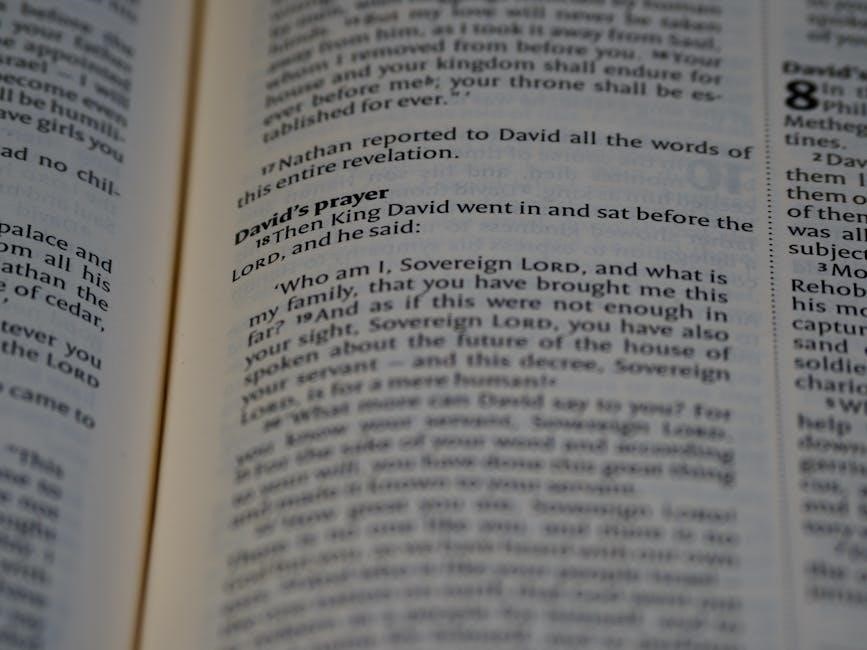The Book of the Wars of the Lord is an ancient anthology of poems and narratives detailing God’s victories over Israel’s enemies, offering theological insights into divine justice and Israel’s role in God’s plan․
Overview of the Book
The Book of the Wars of the Lord is an anthology of ancient poems and narratives recounting God’s victories over Israel’s enemies․ It provides a theological and historical account of Israel’s journey, emphasizing divine justice and intervention․ The text is fragmented, with its most notable reference in Numbers 21:14-19, which mentions its existence․ It likely served as a source for understanding Israel’s early conflicts and the role of poetry in preserving their history․ The book’s structure and content highlight its significance as a theological and literary work, offering insights into Israel’s identity and God’s role as a warrior in their history․
Historical Significance
The Book of the Wars of the Lord holds profound historical significance as a collection of ancient texts detailing Israel’s early conflicts and divine interventions․ Its fragmented nature, with references in Numbers 21:14-19, suggests it was a key source for understanding Israel’s formative period․ The book’s emphasis on God as a warrior underscores its theological importance, providing insights into the belief systems of early Israelites․ Historians and scholars value it for its potential to illuminate the cultural and religious context of the ancient Near East, making it a vital, though elusive, piece of historical literature․
Biblical References to the Book of the Wars of the Lord
The Book of the Wars of the Lord is referenced in Numbers 21:14-19, highlighting its significance in Israel’s history and divine victories․
Mentions in the Book of Numbers
The Book of the Wars of the Lord is explicitly mentioned in Numbers 21:14-19, where it is cited as a source for understanding Israel’s conflicts and divine victories․ This biblical reference highlights its significance as a historical and theological text, detailing the conquests of the Israelites under God’s guidance․ The passage in Numbers provides a fragmented glimpse into the book’s content, focusing on geographical and military events․ It underscores the book’s role in preserving Israel’s history and its theological themes, such as God as a warrior․ This reference remains a crucial link to the book’s origins and purpose․
Contextual Relevance in Scripture
The Book of the Wars of the Lord holds significant contextual relevance as it provides historical and theological depth to Israel’s journey․ Cited in Numbers 21:14-19, it serves as a source for understanding divine victories and Israel’s conquests․ The book’s inclusion in Scripture underscores its importance in framing Israel’s identity and God’s role as a warrior․ Its themes of divine justice and deliverance align with broader biblical narratives, making it a valuable text for scholars studying Israel’s history and theological development․ This ancient anthology remains a key resource for understanding God’s intervention in Israel’s affairs, offering insights into the nation’s formation and purpose․

Historical Context of the Book
The Book of the Wars of the Lord chronicles key events in Israel’s history, including the formation of the twelve tribes and significant battles, highlighting divine intervention․
Formation of the Twelve Tribes of Israel
The formation of the twelve tribes of Israel is central to the nation’s identity, rooted in the patriarch Jacob’s twelve sons․ Each tribe played a unique role in Israel’s societal structure, both politically and religiously․ The Book of the Wars of the Lord references this formation in its accounts of divine victories and historical events․ The tribes’ organization under God’s guidance underscored their covenantal relationship and communal purpose․ This structure was vital for their survival and prosperity, reflecting a divine plan that shaped their identity and destiny as a chosen people․
Key Events and Battles Described
The Book of the Wars of the Lord details pivotal battles, such as the solar miracle in Joshua 10, where God fought alongside Israel․ It chronicles divine interventions, showcasing God’s direct involvement in Israel’s victories․ These accounts emphasize theological themes, highlighting God as a warrior and the execution of divine justice․ The battles are not merely historical events but reflections of God’s covenant faithfulness․ This section underscores the book’s role in preserving Israel’s military and theological heritage, framing warfare as a divine act rather than human effort alone․ These narratives serve as testimonials to God’s power and presence in Israel’s history․
The Role of Poetry in Ancient Israelite Warfare
Poetry played a central role in ancient Israelite warfare, as seen in the Book of the Wars of the Lord․ It served as a medium to celebrate divine victories, invoking God’s presence and power․ These poetic compositions were often recited before battles to inspire troops and after victories to commemorate God’s intervention․ They also functioned as theological teachings, emphasizing God’s role as a warrior and the execution of justice․ By preserving these poems, the book highlights the spiritual dimension of warfare, blending history with theology to reinforce Israel’s covenant identity and trust in God as their ultimate defender․

Contents of the Book of the Wars of the Lord
The book contains 27 chapters, detailing divine victories, poetic descriptions of battles, and fragmented geographical notes, serving as a theological and historical account of Israel’s warfare․
Structure and Chapters
The Book of the Wars of the Lord is divided into 27 chapters, each focusing on specific events and divine interventions in Israel’s history․ The structure combines fragmented geographical notes with poetic descriptions of battles, creating a unique blend of history and theology․ While the text is not fully preserved, the extant portions suggest a chronological flow, beginning with creation and moving through pivotal events like the parting of the Red Sea․ The chapters emphasize God’s active role in warfare, blending narrative and poetry to illustrate divine justice and Israel’s covenantal identity․ This arrangement serves both historical and theological purposes․
Descriptions of God’s Victories
The Book of the Wars of the Lord vividly portrays God’s triumphs over Israel’s enemies through poetic and narrative descriptions․ It highlights divine interventions, such as the parting of the Red Sea and the defeat of Canaanite deities․ The text often uses natural phenomena, like the sun and moon standing still, to illustrate God’s power․ These accounts are intertwined with theological themes, emphasizing God’s justice and covenant faithfulness․ The victories are not just military but spiritual, showcasing God’s sovereignty and Israel’s dependence on Him․ This focus on divine action underscores the book’s central message of trust in God’s deliverance and providence․
Theological Themes and Symbolism
The Book of the Wars of the Lord explores profound theological themes, such as God’s role as a warrior and the concept of divine justice․ It symbolizes God’s sovereignty over creation and history, often using natural phenomena like earthquakes and celestial events to represent His power․ The text emphasizes Israel’s covenant relationship with God, portraying the nation as a chosen people under divine protection․ Symbolism also appears in descriptions of battles, where God’s victories over enemies signify spiritual triumphs․ These themes reinforce the idea of God’s active involvement in human affairs and the ultimate triumph of righteousness over evil․

The Book of the Wars of the Lord as a Theological Text
The Book of the Wars of the Lord is a theological text exploring God’s role as a warrior, divine justice, and Israel’s purpose in His plan, emphasizing covenant and sovereignty through ancient poetry and symbolic battles;
God as a Warrior
The Book of the Wars of the Lord portrays God as a divine warrior, leading Israel to victory against their enemies․ Through poetic narratives, it highlights God’s power and sovereignty, emphasizing His role in delivering Israel․ The text underscores divine justice, where God’s interventions are often depicted as acts of retribution against oppressors․ This imagery reinforces the theological theme of God as both protector and avenger, central to Israel’s identity and faith․ The book’s structure, divided into chapters, further amplifies this portrayal, blending historical accounts with spiritual symbolism to illustrate God’s active involvement in human affairs and warfare․
The Concept of Divine Justice
The Book of the Wars of the Lord emphasizes divine justice as a central theme, illustrating God’s righteous judgment over nations․ It portrays God as a sovereign judge who intervenes in history to punish wickedness and protect the righteous․ The text often describes victories as acts of retribution, aligning with Israel’s covenantal obligations․ This concept underscores moral accountability and the idea of consequences for disobedience․ By framing battles as divine judgments, the book reinforces the theological notion that God’s justice is inseparable from His mercy and sovereignty, shaping Israel’s understanding of His character and their role in His plan․
Israel’s Role in God’s Plan
The Book of the Wars of the Lord highlights Israel’s unique role as God’s chosen people, entrusted with fulfilling His divine purposes․ The text portrays Israel as both recipients of God’s mercy and instruments of His justice․ Their victories are depicted not merely as military triumphs but as fulfillments of covenant promises․ The book emphasizes Israel’s responsibility to remain faithful and obedient, ensuring their survival and prosperity․ This narrative reinforces their identity as a holy nation, called to reflect God’s character to the world, thus centralizing their mission in His broader redemptive plan across human history․

Archaeological and Historical Evidence
The Book of the Wars of the Lord remains fragmented, with scholars analyzing its historical references to events like Israel’s formation and battles, offering insights into ancient warfare and theology․
References to Ancient Poetry and Songs
The Book of the Wars of the Lord contains ancient poems and songs celebrating God’s victories․ These poetic fragments, like the one in Numbers 21:14-19, recount Israel’s triumphs and divine deliverance․ They reflect early oral traditions, preserving historical events through lyrical expression․ Themes of divine justice and Israel’s destiny are central․ These compositions link to broader ancient Near Eastern literary practices, as seen in texts like Sefer Yashar․ The poetic style enhances the narrative, making it memorable and suitable for communal recitation․ This anthology highlights the intersection of poetry, history, and theology in ancient Israelite culture, emphasizing the enduring impact of these poetic traditions․
Parallels with Other Biblical Texts
The Book of the Wars of the Lord shares parallels with other biblical texts, such as Numbers 21:14-19, which references its content․ Similar themes of divine intervention and victory are found in Joshua 10:12-13, where the sun and moon stand still․ These narratives emphasize God’s role as a warrior and protector of Israel․ The book also mirrors the Book of Jashar, another ancient text, in its poetic style and recounting of pivotal events․ Such parallels highlight the interconnectedness of biblical literature, reinforcing theological themes of divine justice and Israel’s covenantal relationship with God․ These connections aid scholars in understanding the historical and theological context of the text․
Modern Interpretations and Studies
Modern scholars analyze the Book of the Wars of the Lord for its theological themes, studying its structure and conducting comparative studies with other religious texts globally․
Scholarly Analysis of the Text
Scholars examine the Book of the Wars of the Lord as an anthology of ancient poetry and narratives, focusing on its theological themes and historical context․ The text’s fragmented nature has led researchers to piece together its contents from references in Numbers and other biblical texts․ Its integration of topographical details underscores its historical relevance․ Analysts highlight its portrayal of divine justice and Israel’s role in God’s plan․ The book’s formation and the battles described are subjects of extensive study, offering insights into Israelite warfare and theology․ Modern interpretations continue to explore its significance in understanding ancient Israelite culture and religion․
Comparative Studies with Other Religious Texts
The Book of the Wars of the Lord is often compared to other ancient religious texts, such as the Book of Jashar and Mesopotamian epic poems․ Scholars note parallels in themes like divine intervention and the portrayal of gods as warriors․ For instance, the Iliad’s depiction of divine battles mirrors the Book’s accounts of God’s victories․ Such comparisons highlight shared motifs across cultures, emphasizing the universal human quest to understand divine justice and warfare․ These studies enrich our understanding of the Book’s theological and cultural significance within a broader religious and literary context․

The Book of the Wars of the Lord in Contemporary Religious Studies
The Book of the Wars of the Lord remains a focal point in contemporary religious studies, offering insights into divine justice and warfare․ Scholars explore its theological themes, such as God as a warrior, and its relevance in modern sermons․ Digital formats like PDFs have made it accessible, sparking renewed interest among researchers and faith communities alike, ensuring its enduring influence in religious discourse and education․
Its Place in Modern Theology
The Book of the Wars of the Lord holds a significant place in modern theology, offering insights into divine justice and God’s role as a warrior․ Its themes of victory and deliverance resonate in contemporary religious discourse, particularly in discussions about God’s sovereignty and providence․ The book is often studied in theological seminaries and universities, where scholars analyze its historical and spiritual relevance․ Digital versions, such as PDFs, have made it more accessible, allowing modern theologians to explore its teachings and apply them to current religious and ethical debates, ensuring its enduring influence in faith communities and academic circles․
Relevance in Sermons and Teachings
The Book of the Wars of the Lord remains a valuable resource in sermons and teachings, offering vivid depictions of God’s divine justice and deliverance․ Its poetic and narrative accounts inspire faith and trust in God’s sovereignty, making it a powerful tool for religious instruction․ Modern preachers often reference its themes of victory and redemption, emphasizing the importance of relying on divine guidance in times of adversity․
The availability of the book in PDF format has further enhanced its accessibility, allowing contemporary religious leaders to incorporate its teachings into sermons and Bible studies, ensuring its timeless messages continue to resonate with congregations worldwide․
Cultural and Literary Influence
The Book of the Wars of the Lord has inspired literature and art through its vivid narratives and poetic descriptions of divine victories, influencing cultural and literary works․
Impact on Literature and Art
The Book of the Wars of the Lord has profoundly influenced literature and art through its vivid narratives and poetic descriptions of divine victories․ Its theological themes have inspired countless authors, poets, and artists, shaping epic storytelling and symbolic representations of warfare․ The book’s imagery of God as a warrior has been depicted in various art forms, from ancient manuscripts to modern digital media․ Its influence extends to religious and cultural works, making it a cornerstone of inspirational creativity across centuries․ This timeless text continues to spark imagination, connecting historical events with contemporary artistic expression․ Its legacy endures in both literary and visual realms․

References in Popular Culture
The Book of the Wars of the Lord has inspired various references in popular culture, particularly in literature and film․ Its themes of divine justice and epic battles are echoed in works like The Lord of the Rings, where the struggle between good and evil mirrors biblical warfare narratives․ The book’s poetic style has also influenced songs and digital media, with its imagery of God as a warrior resonating in modern storytelling․ Additionally, video games and fantasy novels often draw parallels to its theological themes, showcasing its enduring impact on creative expression and cultural narratives across genres and mediums․
Availability of the Book of the Wars of the Lord in PDF Format
The Book of the Wars of the Lord is widely available in PDF format through various online platforms, including academic databases and digital libraries, for free download․
Digitization and Online Availability
The Book of the Wars of the Lord is readily accessible in PDF format through platforms like Library Genesis and Z-Library, offering free downloads with an account․ These digital archives provide unrestricted access to the text, enabling scholars and enthusiasts to explore its theological themes and historical significance․ The digitization of this ancient anthology has made it easier for global audiences to study its poetic descriptions of divine victories and its role in Israelite warfare․ This online availability has greatly facilitated research and deeper understanding of the book’s cultural and religious importance․
Free Resources and Download Options
The Book of the Wars of the Lord is widely available as a free PDF through platforms like Z-Library and Library Genesis․ These digital archives provide unrestricted access to the text, allowing readers to download it without cost․ Z-Library, for instance, offers the book with a daily download limit of 10 books per user, making it easily accessible for scholarly research and personal study․ Additionally, multiple online repositories ensure that the PDF remains readily available for those interested in exploring its theological and historical significance․ This accessibility has made the book a valuable resource for both academics and enthusiasts alike․
The Book of the Wars of the Lord is a valuable resource, offering insights into God’s role in history and Israel’s journey․ Available as a free PDF, it remains a significant text for theological study and reflection on divine justice and Israel’s destiny․
The Book of the Wars of the Lord is an ancient text referenced in Numbers 21:14-19, detailing Israel’s victories and divine interventions․ It is not part of the canonical Bible but is considered a valuable historical and theological resource․ The book is structured into chapters, focusing on God’s role as a warrior and the fulfillment of His plan for Israel․ Its poetic and narrative style highlights themes of divine justice and Israel’s covenant with God․ Available in PDF format, it offers scholars and readers insights into ancient Israelite history and theology, making it a significant text for religious and historical studies․

Final Thoughts on the Book’s Significance
The Book of the Wars of the Lord holds profound theological and historical significance, offering insights into ancient Israelite culture and divine justice․ Its poetic narratives highlight God’s role as a warrior and Israel’s covenantal relationship․ While not part of the canonical Bible, it remains a valuable resource for understanding biblical history and theology․ The availability of the book in PDF format ensures its accessibility for modern scholars and readers, bridging ancient traditions with contemporary religious studies․ Its enduring relevance underscores its importance as a text that enriches our understanding of faith, history, and the divine plan․
